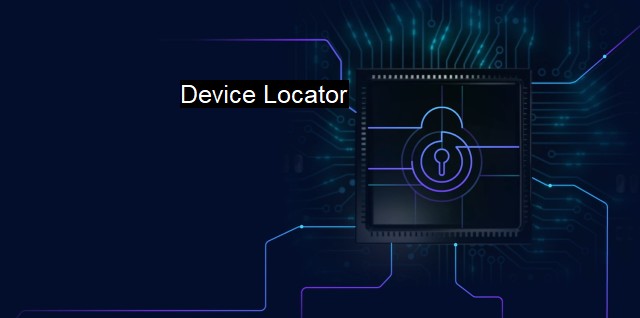What is Device Locator?
The Importance of Device Locator: A Comprehensive Guide on Cybersecurity and Antivirus Software
Device Locator is a crucial tool in the cybersecurity landscape whose primary function is to keep track and find the geographical location of different devices. This technology allows the user to coordinate the place of any smart device such as a computer, mobile, or other wireless devices in real-time based on the device's internet or GPS connection. the role of the Device Locator extends from mere device localization to other arenas leading to securing networks and data from various cyber threats.In the expanding digital era, mobile devices have become a substantial repository of personal and corporate data. Simultaneously, threats associated with device loss, theft, or any manipulation carry severe consequences such as data breach, financial repercussions, and identity theft. Here, Device Locator aids as a proactive measure in safeguarding critical information. In the face of a potential security breach, it provides users the capability to remotely dictate device operations like data wiping, software installation, firing an alarm, or locking their device
The deceptively simple concept of Device Locator contributes significantly to secure the existing network. Every device connected to a network has its unique IP address, which stands as an ascertainable identifier on the internet for that device. Inappropriate use of these IP addresses can lead to fraudulent activities. A device locator can track these IP addresses, enabling network administrators to recognize all devices connected to their network and understand the patterns of network traffic. Such an understanding allows network managers to detect any anomalies and potential cyber threats timely, leading to an enhanced security framework.
The device locator's troves also extend to arms antivirus stakeholders in combatting the malice of viruses, malware, and more. Device Locator can map the network's active devices to trace back any malicious cyber components to its originating device. With this, antivirus programs can analyze and ascertain the spread pathway of such threatening elements, thus, stopping them at their root, mitigating any extensive damage.
Contemporary hackers are increasingly attempting to manipulate GPS and IP location data to their advantage, leading to threats like spoofing attacks. In such cases, Device Locator could intervene by providing location reality checks for different devices. This location referencing can discern any inconsistencies and deviations in the reported location data of any device, setting off a preemptive alarm of potential cyber threats.
Device Locator is an unassuming yet pivotal concept in the sphere of cybersecurity and antivirus. It is not just limited to geographically finding lost or stolen smart devices but goes beyond in stringently maintaining the security health of individual devices and networks. Device Locator thus increases organisational awareness of their devices' environments and helps build a strong security posture. With this continual device location tracking, threat mitigation and forensic assessments can be performed more effectively, aiding in addressing the increasing concerns of cybersecurity in data-driven lives.
Consequently, Device Locator as a cyber surveillance design does not claim to be an ultimate solution against rising cyber threats. Instead, its intention is to be an incremental part of a multilayer security mechanism, a supportive accomplice to other antivirus and cybersecurity measures. Thus, Device Locator typifies a fundamental aspect of today's layered cybersecurity strategies, as an effective reaction to an ever-evolving security threat landscape.

Device Locator FAQs
What is a device locator in the context of cybersecurity and antivirus?
In the context of cybersecurity and antivirus, a device locator is a tool that helps track lost or stolen devices such as smartphones, laptops, or tablets. It works by using the global positioning system (GPS) to locate the device and then provides the owner with its location. This tool is especially useful for companies that have sensitive or confidential information stored on their devices.How does a device locator work?
A device locator works by using GPS technology to track the location of a lost or stolen device. The owner of the device can access the locator tool from a secure application or website and receive real-time updates on the device's location. Some locator tools also have additional features such as the ability to remotely lock or wipe the device's data to protect sensitive information.Is a device locator effective in preventing cybersecurity threats?
While a device locator cannot prevent all cybersecurity threats, it can be effective in preventing the loss or theft of a device containing sensitive information. By quickly locating and recovering a lost or stolen device, a device locator can help prevent unauthorized access to confidential data. Additionally, some locator tools have anti-virus and anti-malware features that can detect and remove malicious software that may pose a cybersecurity threat.Are there any limitations to using a device locator for cybersecurity purposes?
One limitation of using a device locator for cybersecurity purposes is that it requires the device to have an internet connection and GPS enabled. If the device is turned off, out of range, or has a dead battery, it may not be possible to locate it using a device locator. Furthermore, a device locator is only effective if it is installed and configured correctly, and if the user takes proper security measures such as using strong passwords and regularly updating their device's software.| | A | | | B | | | C | | | D | | | E | | | F | | | G | | | H | | | I | | | J | | | K | | | L | | | M | |
| | N | | | O | | | P | | | Q | | | R | | | S | | | T | | | U | | | V | | | W | | | X | | | Y | | | Z | |
| | 1 | | | 2 | | | 3 | | | 4 | | | 7 | | | 8 | | |||||||